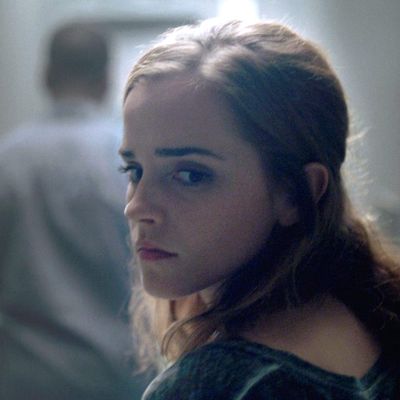
Most of The Circle plays ridiculously, thank God: If in ten years we look back on it and think, “Yep, they got it right,” we’ll really be screwed. We’ll probably still think the movie isn’t very good, though.
It’s named for a powerful tech company — Facebook with aspects of Apple and maybe Google. But think Facebook because its hook is community and its principal product a social interface app called TruYou. Emma Watson plays Mae, a young, ingenuous woman who lands a low-level but much-coveted job and gazes in wonder at the sunny, invasively social employees on its rolling grounds outside San Francisco. They’re like chirpy little Stepford Techies with camera phones trained on everyone else.
Dave Eggers adapted his novel along with the director, James Ponsoldt, who did a good job with The Spectacular Now. The tone of that was all of a piece, whereas The Circle is a tonal mess: part satire, part moralistic melodrama. Some of it is broadly acted, some of it subtle, much of it overheated. It has great moments, though. It hits its peak early on with the first appearance of Tom Hanks as Eamon Bailey, the Mark Zuckerberg/Steve Jobs–like guru who walks out on a nearly bare stage and puts on a show that Mae watches with shining eyes. Really — I wondered if the filmmakers put gel in them to make them shine so brightly.
The theme of The Circle is transparency versus privacy. Onstage, Bailey explains that privacy is the enemy, that keeping tabs on everyone will mean dictators can’t violate human rights and children will be protected from molesters. (The plan, we learn, is to embed sensors in kids’ bones.) He considers keeping secrets a form of lying. He says, “Knowing is good, but knowing everything is better.” His employees go wild.
Which raises at least two questions, the first is whether that’s a trade-off worth making — most people would say no, even as they give away more and more information in exchange for convenience. The second is whether Bailey is philosophically sincere or another power-mad monopolist in social-reformer’s clothing. The best thing about Hanks’s performance is that he plays up the sincerity. And he’s Tom Hanks, father of us all — we want to trust him. If Bailey is acting, he’s the best actor on earth. Of course, in the wings he has a somewhat stereotypical publicity-oriented partner, Tom Stenton, played by Patton Oswalt. But hey, even Mother Teresa needed PR. Maybe Stenton is a necessary evil.
Maybe not. Does the company have to keeps tabs on everything Mae does — her comings, goings, hobbies, even a social rating by peers? She has another watcher: John Boyega as Ty, the inventor of TruYou, who roams the buildings like the Phantom of the Circle dropping moral and ethical judgments — and reminding Mae that the company’s power is growing and remains unchecked. Poor Mae is swayed by him. She’s so torn she goes kayaking in San Francisco Bay in the middle of the damn night and, in a poorly staged scene (it’s pretty clear she’s in a tank), nearly drowns. She’s rescued, wouldn’t you know, with the help of the Circle’s new, omnipresent surveillance system, SeeChange. The rescue footage goes viral and Mae is a star.
She also becomes a company spokesperson. Quickly — too quickly, scenes must have been cut — Mae becomes the Circle’s most flamboyant proselytizer, pushing for less privacy, more surveillance. So The Circle turns into a corruption story, with one nice character sacrificed in a sequence that makes the movie go off the rails — literally and figuratively. The question hangs: Will Mae be uncorrupted? Eggers’s book goes one way, the movie the exact opposite — though the ending here is confusing and smacks of desperation, with Hanks’s last line a sop to the audience and a coda that seems to undo what came before. (Is it meant to be ironic? Probably. Who cares?) Watson, meanwhile, is giving her features quite the workout. She’s very likable (the camera adores her), but she acts so hard that she gets tiresome.
The movie isn’t as bad as some of the early reviews have suggested. (It was kept from critics until its opening at the Tribeca Film Festival, a madhouse with appearances by the director and stars.) It’s in the honorable tradition of the Elia Kazan–Budd Schulberg morality play A Face in the Crowd. But it pales beside the terrifically scary (and depressing) British TV series Black Mirror, which finds more imaginative ways to portray our happy surrender to technology.
On a sad note, the late Bill Paxton plays Mae’s father, who has MS, and it hurts to watch him so enfeebled, even if he’s only acting. We’re already reeling from another premature death this week: Jonathan Demme. Welcome to What a Shitty Year: The Sequel.


